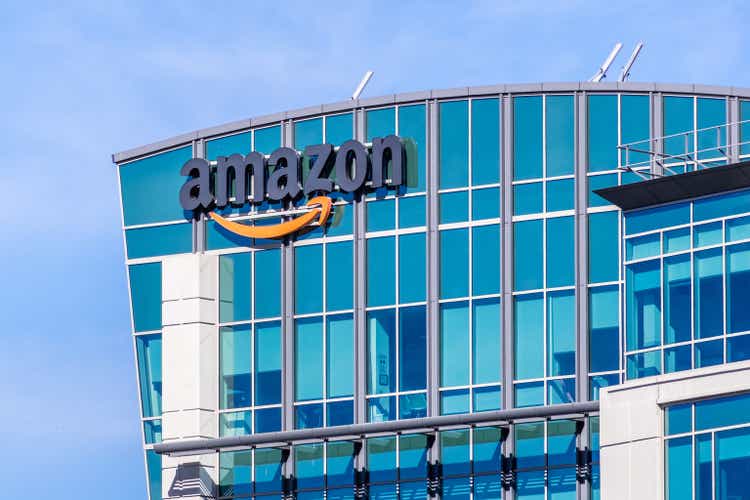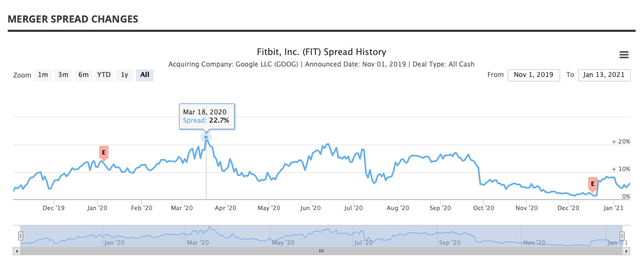
Sundry Photography
When Amazon (NASDAQ:AMZN) announced its acquisition of healthcare services company 1Life Healthcare (NASDAQ:ONEM), the parent of One Medical, three weeks ago, I felt that Amazon was getting a great deal and that the acquisition would be beneficial for all stakeholders. The $3.9 billion price tag Amazon was paying for the company made this Amazon’s third-largest acquisition, after the company’s $13.7 billion acquisition of Whole Foods in 2017 and its $8.5 billion acquisition of MGM Studios.
The $18 per share all cash deal represents a premium of over 76% to the day before the announcement and a 90% premium to the 30-day average price of 1Life Healthcare. I wrote the following about 1Life in one of our Merger Arbitrage Mondays post after the deal was announced,
Having worked in healthcare services in a San Francisco based company, I was acutely aware of One Medical, a company that was attempting to reinvent the way primary care was delivered to patients. 1Life Healthcare also known as One Medical was founded by Tom Lee in 2007. Google was an early investor in the company and by the time the company went public in January 2020, The Carlyle Group with a 27% stake, was its largest investor.
1Life and the One Medical entities do business under the “One Medical” brand. The company operates as a membership-based primary care practice. One Medical grew from a single clinic in San Francisco to 182 medical offices in the United States, providing 24/7 virtual care. Patients can access virtual medical services provided by One Medical for an annual membership fee of $199. One Medical was unique as it required an annual subscription and more often than not, that subscription fee was picked up by the employer because of the company’s deep rooted partnerships with several large companies.
Amazon attempted to transform the U.S. healthcare system through a partnership with Berkshire Hathaway and JPMorgan Chase by creating a non-profit called Haven and installing respected surgeon and author Dr. Atul Gawande as the CEO of this new initiative.
With the acquisition of 1Life Healthcare and its pharmacy business through PillPack, Amazon could finally start to put a small dent in the highly convoluted, expensive and inefficient U.S. healthcare system. Whether this decision is seen as altruistic or monopolistic by regulators remains to be seen. Although the word altruism and Amazon in the same sentence don’t seem right, I am hopeful that regulators will see this as a way for an innovative company like 1Life Healthcare to deliver quality care to more patients, especially considering 1Life has remained unprofitable for several years.
I was very surprised to see Amazon announce the $1.7 billion acquisition of iRobot (NASDAQ:IRBT) in a $61 per share all cash acquisition, exactly two weeks after announcing the 1Life deal. It looks like CEO Andy Jassy is taking a page from Jeff Bezos’ playbook from 1998-1999, where Amazon went on to complete 14 acquisitions in a 21-month period.
What is even more surprising is the odds arbitrageurs are giving to both these deals closing. As I write this on a Friday afternoon, the 1Life Healthcare deal is trading at a spread of 4.96% and the iRobot deal is trading at a narrow spread of 2.16%. Assuming both deals close by the end of the year, their potential annualized returns work out to 12.83% and 5.59%.
The difference in premiums that Amazon paid for both these deals is reflected in their spreads, considering Amazon only paid a 45.48% premium to the 30-day average price of iRobot before the deal was announced and a 90% premium for 1Life. If, for some reason, the deals were to fall through, the downside risk for 1Life is much higher. The fact that CVS was also interested in 1Life before Amazon stooped in and picked up the company might cushion some of the downside.
The other and more important signal from these spreads is the perceived regulatory risk for the deals. Last week, I wrote about how the FTC threw a wrench into Meta Platform’s (META) plans to acquire the privately held VR company Within Unlimited. In a regulatory environment like the current one we find ourselves in, I would have expected the spread on the iRobot deal to be higher. It took Google 440 days to close its acquisition of Fitbit (most deals close in about 120 days) and the spread on that deal at one point was as high as 22.7%.

Google – Fitbit Deal Spread History (Inside Arbitrage Database)
Amazon already has a significant presence when it comes to home-based IoT devices, includes its internally developed products like the Echo as well as acquired products like the Ring doorbell and the eero Wi-Fi mesh systems. If regulators were concerned about the accumulation of data in the hands of a few as they were with Fitbit-Google and right now with the acquisition of Change Healthcare (CHNG) by UnitedHealth Group (UNH), I would expect something similar with the acquisition of iRobot.
Unless I am missing something, at the very least, it could take longer than the end of the year for the iRobot deal to close. I decided to invest in 1Life since the spread on that deal was approaching 7% a few days ago, and I believe the probability of that deal closing is higher.


Be the first to comment